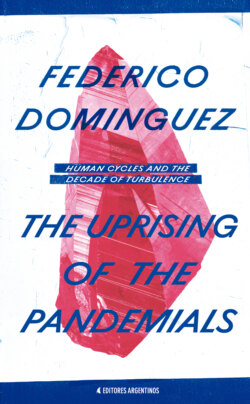Читать книгу The Uprising of the Pandemials - Federico Dominguez - Страница 23
На сайте Литреса книга снята с продажи.
THE NEXT CYCLE OF INEQUALITY
ОглавлениеArgentinian philosopher Mario Bunge said in a 2008 interview with local newspaper Perfil: “As long as there are clear disparities, there will be class struggles and interests. The truth is that when you meet basic needs, conflict is subdued and more constructive tactics are adopted.” (72) In a context marked by the pandemic crisis, inequality will be more exposed than ever and the temptation to try and solve it using methods that already failed in the past will be stronger than ever before.
The current cycle of inequality will come to a close toward the end of this decade due to the inevitable shift in politics driven by the pandemials. The start of this new and inescapable cycle will either be thanks to a new generation of liberal governments that will tackle inequality pragmatically or by the arrival of populist governments that will reduce inequality using old-fashioned methods that may work in the short-term but will seriously affect investment and the economy’s ability to innovate, thus significantly impoverishing countries in the medium and long term.
When you do the math, you can see that there is a lot of money available to reduce inequality without turning to populist policies: $5 trillion between tax evasion and corruption alone. Another significant amount by reducing inefficient public spending as we saw in Latin America. Also, scaling down deductions and applying an effective 40% income tax on the rich could collect several hundreds of billions of additional tax dollars. This huge mass of resources will be necessary to reduce taxes on consumption and labor, the main culprits behind the limited available incomes of the lowest earners. What is equally as important as increasing available resources –if not more so– is eliminating regulations that restrict the supply of goods and services that constitute the meritocracy basket.
However, given the context of the overwhelming income disparity caused by technological change, this will not be enough. Income transfer programs like Earned Income Tax will also be necessary on a significant scale. Lastly, meritocracy depends on governments’ ability to finance free, quality healthcare and education for its entire population, whether it is provided by the state or by the private sector.
As we saw throughout this chapter, inequality is a vast phenomenon that must be tackled from different angles. It is a problem that demands immediate action because, if left unaddressed, it could open the door to a new era of worldwide populism.
